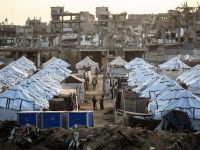By Jon Pattee
Senior English Editor
Albawaba.com - Amman
The Arab World’s long-running war over translating Arabic texts into Hebrew has flared up again, this time sparked by Palestinian intellectual Edward Said.
Key opponents of normalizing ties with Israel bitterly criticize such translations. But the crucial point in the conflict, according to Said’s May 23 column in the Egyptian daily Al Ahram, is the potential of translated texts to effect a change so that the Israelis “stop treating [Arabs] as animals or less-than-human.”
“Isn’t [Arabic-to-Hebrew translation] a far more intelligent and useful thing than the craven “normalization” of the various countries that have trade and diplomatic relationships with the enemy even as the Palestinians are being killed like so many flies by the Israeli army and air force?” Said asks in his column, Defiance, Dignity, and the Rule of Dogma.
The author, who has supported the translation of his own works into Hebrew, says Israeli publishers who translate Arab works do it as "a sign of cultural protest against Israel’s barbarous Arab policy.”
At the root of the current conflict is Israel’s decades-old military occupation of Palestinian land, and the consequent long-running Arab effort to block normalization of ties with the Jewish state.
Nearly every Arab state has an anti-normalization campaign of some sort. This is true even in countries like Egypt, which signed a peace treaty with Israel in 1979, and Jordan, whose 1994 treaty paid off in the form of “qualifying industrial zones” whose mandatory Israeli input wins their products duty-free access to US markets.
Perhaps because of these losses in the political and economic fields, Arab writers, actors and musicians -- particularly their professional associations -- have been in the front line of anti-normalization campaigns. This week, for example, saw Egyptian Actors Guild head Youssef Shaaban tour south Lebanon, throw stones at the Israeli border, and express the support of “all” Egyptian actors for the Lebanese and Palestinian causes.
Last November, Shaaban expelled a director from the guild for asking the ministry of social affairs for permission to form an Egyptian-Israeli Friendship Association. For its part, the Egyptian Writers Association expelled writer Ali Salem for his call for cultural normalization with Israel and for visiting the Jewish state.
War of Words
Expulsion from a professional association, however, is a fairly tame fate compared to that of anti-normalizers in some countries with ties to Israel.
In Jordan alone, at least 22 members of the professional associations’ anti-normalization committee are jailed and may face long prison terms. Their detentions and arrests, while purportedly not linked to their committee activities, followed close on the heels of their release of a blacklist of alleged normalizers.
Against this backdrop, it would be unsurprising if Said’s most recent statements provoked a sharp reaction from anti-normalizers.
Battle lines have already been inked over the general translation idea, but are made more tangible by an Israeli academic project to translate Egyptian literary works, ostensibly to promote better Arab-Israeli understanding.
Sparks first began to fly when the Israeli project organizers contacted the daughter of the late Egyptian writer, Abdel Hakim Qassem, proposing to translate Qassem’s novel Alayyam Assaba’h (The Seven Days) into Hebrew.
Qassem’s daughter refused to give them permission, and told the London-based daily Al Sharq Al Awsat that she would take legal action to block the move, if necessary.
She said that her stance was based on respect for her father, who had opposed normalization, as well as outrage over daily Israeli atrocities against Arabs in Palestine, Lebanon and Syria.
Translations Expose Rifts in Israeli Society
In a parallel war of words, Israeli society itself shows signs of strain when the subject of Arabic-to-Hebrew translations comes up.
Last year, then education minister Yossi Sarid outraged the Likud Party and other right-wing groups by forcing a literature curriculum committee to include selected works of nationalist Palestinian poet Mahmoud Darwish in Israeli schoolbooks. According to the online journal Inside Israel, Sarid’s move even prompted then prime minister Ehud Barak to declare that “conditions are not yet right for teaching Darwish in the schools.”
In an editorial implicating Sarid in “ideological bullying,” the Jerusalem Post tackled head-on the dangers of including Darwish’s perspective in textbooks.
“The unignorable asymmetry of religio-cultural sensitivities in the region should be redressed before Israeli pupils - especially 11th and 12th graders contemplating army service - have their political sympathies toyed with in an experiment of idealism.”
As if to bear out these fears, as well as Said’s arguments, a columnist for the Israeli daily Haaretz had this to say of the Darwish row: “It has come terribly late, but at last Israeli students, who were taught that the Arabs were always the bad guys and we were the only ones in the right, will discover that the coin has another side too.”
Said has harsh words for those who would brush aside such realities in Israel, while promoting expulsions and similar acts in the name of anti-normalization.
“When we mistake puerile acts of defiance for real resistance, and when we assume that know-nothing ignorance is a political act…and when we shed all dignity and clamor for American patronage and attention, surely our sense of self-respect and dignity is in tatters.”







